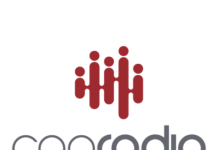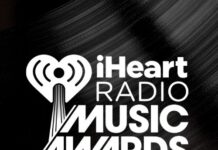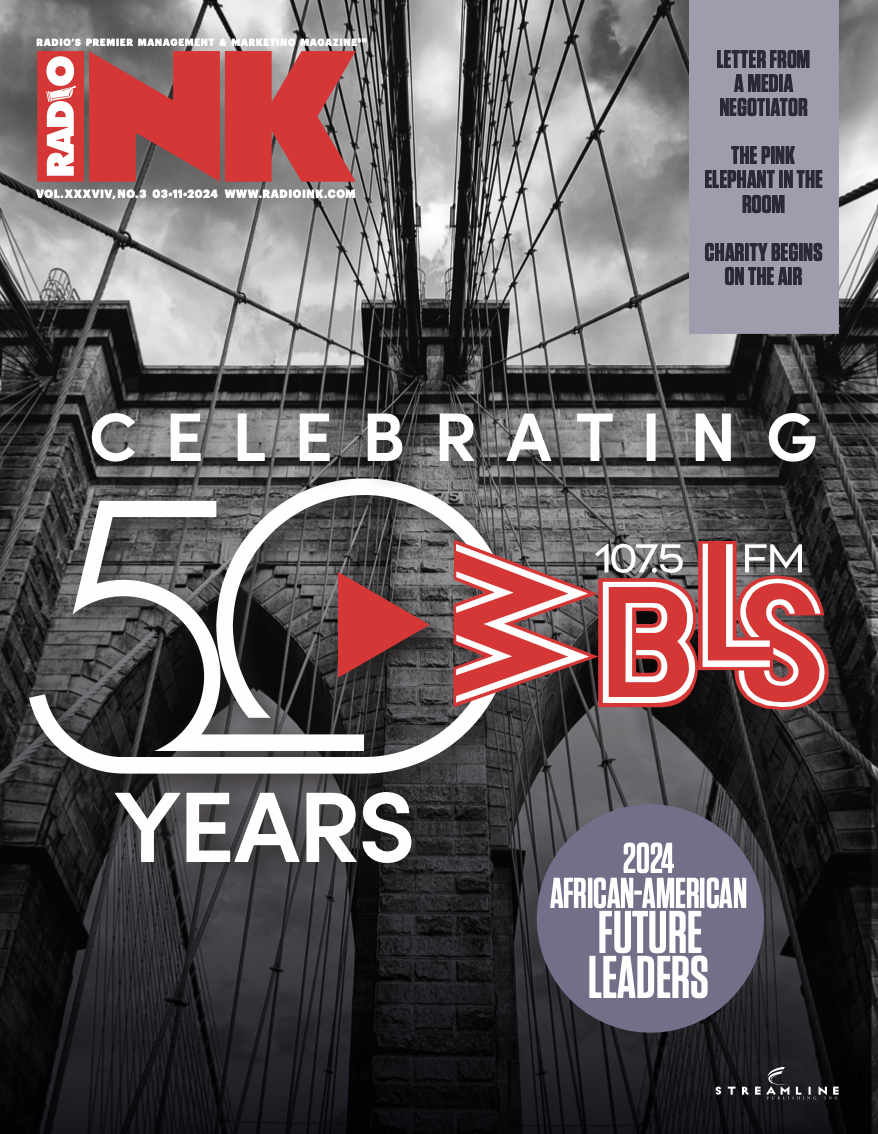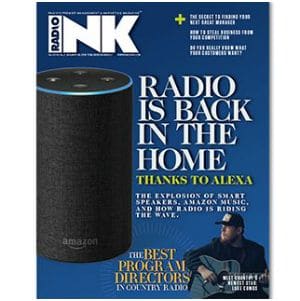
By Editor-In-Chief Ed Ryan
2017 was the year radio really grabbed onto the importance of being part of the next wave of how consumers listen to music. Voice devices such as Amazon’s Alexa and Google’s Home were luxury items only a few short years ago. Today, they are part of the mainstream. And the radio industry is seizing on the opportunity to be a part of that new outlet for listeners to tune in to their stations.
We’re hearing every week about companies and stations becoming “Alexa-enabled,” making listening to radio as simple as walking through your front door and asking Alexa to play Z100 in New York or 98 The Sports Hub in Boston or KMPS in Seattle.
These home voice-activated devices were a hot item during the 2017 Christmas shopping season, and there are no signs of that slowing down. In late 2017, Juniper Research reported that smart devices like the Amazon Echo, Google Home, and Sonos One will be installed in 55 percent of U.S. households by 2022. The same report stated that over 70 million households will have at least one smart speaker, and the total number of installed devices will be more than 175 million. eMarketer recently reported that 35.6 million U.S. consumers used a voice-activated device at least once per month in 2017, representing 128.9 percent growth over 2016.
The leader in this space is, of course, Amazon, with its signature Alexa technology. Amazon has been in the music space for 20 years, since the company started selling CDs online. That was followed up with digital music in 2007 and Prime Music in 2014. Now, “smart speakers” are pushing out Amazon’s music collection in a whole new way.
These devices are also giving the radio industry a prime opportunity to re-engage with the listener at home — something that has started to disappear as consumers become more and more engaged with their smartphones and other devices. The goal, of course, will be to make sure your radio station has strong enough content to keep the listener engaged when he or she moves from the car to the home, or vice versa (and to make sure your radio station is Alexa-enabled).
Is there a way the biggest company in the world can help your industry become even more relevant? One of the things we learned from our interview for this cover story is how super-focused everyone is on the customer, and how that’s driving a lot of their decisionmaking. Sounds pretty similar to what you’re doing.
We spoke to Amazon’s Ryan Reddington and Alex Luke to see if they believe there is a way for us to work together. Could Amazon drive more people to radio? Can radio help Amazon Music understand more of what their customers want? Amazon is also making a big splash at the Country Radio Seminar this year, sponsoring a huge music event on the opening night of the convention. Sounds like the partnership has already begun.
Ryan Reddington is director of Amazon Music in the United States. He has overseen the launch of two Amazon Music streaming services: Amazon Music Unlimited in October 2016 and Prime Music in June 2014. He also spearheaded Amazon’s exclusive deal with Garth Brooks, bringing the country superstar’s music catalog to streaming for the first time ever. Reddington began his Amazon career working on the video team before joining music, where he worked as a category leader in physical media before digital and streaming.
Onetime Q101 Chicago PD Alex Luke is global head of programming and content strategy for Amazon Music. Before joining Amazon in 2017, Luke was a founding member of the Silicon Valley venture capital firm the Valley Fund, managing developing investments in digital media and entertainment. From 2011-2013, he was EVP of A&R at EMI Music, and before that he was director of music programming and label relations globally for Apple. He’s also served as VP/music programming and label relations at Napster, where he transitioned the service to a legal streaming and download platform. As a broadcaster, Luke programmed Q101 in Chicago and KPNT in St. Louis, and worked on the air at KDGE/Dallas and KROQ in Los Angeles, among other stations. He began his radio career with NPR affiliate KAMU-FM.
Radio Ink: What is your day like at Amazon Music? 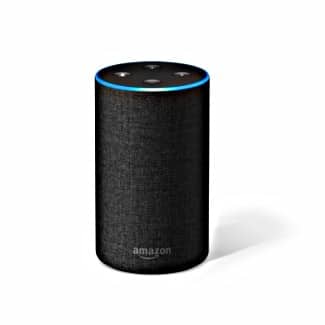
Reddington: I’ve been at Amazon for nine years; I spent the first few years on the video side of the business and the last six on the music side. One beauty of my job is that no day is the same. We spend a lot of time working with the labels on the strategy of how to get customers to engage further with Amazon Music.
Obviously, there are big licensing deals we need to have in place to run our music service, and there are the distribution partners — not just Echo, but also third-party partnerships to help us grow. On a daily basis, it could be anywhere from working with a manager or label to talking with a potential business-development partner to internally talking about marketing and merchandising efforts to help grow our service and engage customers.
Luke: A lot of what I do is focused on what I characterize as the nuts and bolts of programming, making sure any kind of station or playlist that a customer might be looking for is an awesome listening experience and delivering exactly what they need. I also manage the original content and artist relations team. So we are on the phone with managers and artists and labels, shaping something that’s meaningful to them and their fans.
Reddington: At Amazon, customer obsession is a big priority for us. We spend a lot of time looking at the data to understand how customers are interacting with our music service and trying to figure out where we can continue to improve on their behalf.
Radio Ink: How has your relationship with the record labels evolved?
Reddington: What’s interesting at Amazon is that physical music was the second category added, behind books. So, for nearly 20 years, we’ve had relationships with the record labels and music fans. That relationship has been there. Our physical business continues to be important to us, and we monitor it closely.
We launched digital music in 2007. We started Prime Music in 2014, and at that time it was a little bit different product. There were folks focused on Internet radio and others looking at a full catalog of on-demand experiences. We saw an opportunity to build a great mainstream music product through Prime Music, a couple of million songs, but we removed the ads and had unlimited skips and offline capability.
Discussions in those early days were very positive in the sense that Amazon was looking at trying to build a product that was different from what other folks were doing. From there we’ve had tremendous success with Prime Music. Then Alexa and Echo came along, which has taken things to new heights. On a daily basis, I think record labels are excited we have great partnerships in place. Coming out of last year, I don’t think we could be more bullish about how things are going to be in 2018.
Radio Ink: Is the public moving away from purchasing and downloading songs to using products like Alexa?
Luke: I think there’s evidence that customers are accessing music in all sorts of ways. Vinyl sales have been up the last few years in a dramatic way, and as Ryan pointed out, we’ve been in the physical music business and we’ve done downloads, and now we’re doing streaming. For us, it’s about trying to offer every variation that a customer might ask for wherever they’re looking for it, and then letting them lead us down the path of what might be the best experience.
Reddington: I think you see from the year-end recap, from the industry perspective, the download business is in decline and streaming is going up. I certainly think you see evidence that streaming is becoming much more popular and more mainstream. Ultimately, we are at a place where we let customers choose the format where they want to consume the content, whether that be a CD or vinyl or purchasing digital albums. We are here for them.
Luke: A lot of the growth we’ve seen in streaming has come from the proliferation of smartphones across the last 10 years, and devices like Echo in the last few years.
Radio Ink: What is the goal of Amazon Music?
Reddington: We want to have the best streaming music service available on voice in the world. That’s what we wake up thinking about. How do we continue to innovate in the voice space? We are hyper-focused on our customers and want to make sure, as technology improves, as Echo and Alexa continue to grow, we’re right there leading innovation around voice. We spend a lot of time talking about that inside the Amazon walls.
That’s not to say mobile is not important, because it is. The desktop interface and web browser are important. We see where music is going in the future. Voice is a key strategic priority for us, and we want to be leading the pack.
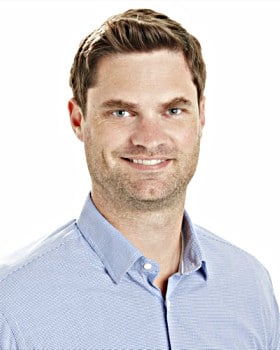 Radio Ink: You guys are going to be at CRS this year. What’s the thinking behind coming to a radio event?
Radio Ink: You guys are going to be at CRS this year. What’s the thinking behind coming to a radio event?
Reddington: We’ve been visiting CRS for years because it’s a great time with a lot of folks in town, a highly respected convention in the industry. We have always had a lot of respect for what they can do. Last year I was lucky enough to give a presentation around Amazon Music and Alexa and how Amazon viewed the future of voice and streaming music. I had an incredible experience.
I think if you look at best-in-class conventions, CRS is right there at the top. For us it’s an opportunity to see the folks we work with in the industry on a daily basis, albeit on video-conferencing. The country genre in particular performs extremely well at any given point in time outside the holidays. Half the songs in the top 50 are country. Our number one station with Amazon Music is a Country station.
We have a deal with Garth Brooks; we are the only place you can find his music streaming or for digital download purchase. We see Country radio as complementary to our business. We see streaming taking over for what people were purchasing; they are now streaming. But we still see radio as an important factor in the whole music ecosystem. Having those relationships is important to us.
Luke: The way radio has historically driven customers to record stores is that people hear songs on the radio. Streaming services are the outlet for getting that music. One thing I will say about CRS is Country radio has a unique relationship with artists and fans that puts CRS in a different place.
We look at our strength in country music and how we amplify what we’re doing in country music — the relationship between radio and the artist and the relationship between fans and artists is deeper in country than we see in other genres.
Reddington: There is no other genre where you have a community like Nashville and CRS that pulls everybody together. From a fan’s perspective, it’s pretty amazing.
Luke: It’s one of the few genres where you see artists on stage accepting awards and thanking the Country program directors by name. That doesn’t happen in other genres.
Radio Ink: Talk about how the Garth Brooks deal came about.
Reddington: We were about to launch a full-catalog music service — Amazon Music Unlimited. At that point we had a download store for digital and Prime Music in the marketplace, and he had an album come out, Gunslinger. As we were looking to get into the full-catalog music service with Amazon Music Unlimited, the stars seemed to align with Garth and his team.
We sat down with his management team and laid out our vision of how we thought it was important to be in the physical music game and downloads and the streaming space, to give the fans the menu of options for how they want to consume music.
We wanted to understand what his goals were in the music business and where he wanted to take his catalog. He owned the masters, from a streaming perspective. Both parties agreed on how we thought things could go, and we were able to forge a partnership that has been incredible.
Luke: It was exciting to see him get his first number one in 10 years, and we felt like we were a part of that story. It was exciting to be working with him at this point in his career.
Reddington: As part of this partnership, we sponsored his tour that just came to a close, his North American U.S. tour, 6 million tickets sold over the course of two or three years. He happens to have a new book out that is supported by Amazon that is a number one book for nonfiction. It’s been a very well-rounded partnership, and he is an incredible talent.
Radio Ink: What do you guys believe Alexa and other devices are doing for music?
Luke: It’s a really exciting time to be in the music business. I think what is happening with voice is additive, and is a big part of why the streaming music business is booming. By putting a voice-activated device in the home, we’re engaging consumers in a way that has been nonexistent.
A lot of fans of music have been distracted by TV, film, video games, the Internet, and I think what the music business has gone through in the last 17 years, the changes have been dramatic. For the first time, we’re really forging new ground with voice. It’s an exciting change in the way people are engaging with music.
Reddington: I think any great technology is extremely complicated on the back end but very simple for the customer on the front end. My personal experience getting home from work and going into my kitchen, if I was going to be in there for five or 10 minutes, I probably wouldn’t want to take the time to get my phone out, unlock it, find a Bluetooth device or a receiver, open up whatever music service I use, and choose a playlist. That’s a lot of work.
Now I can walk in and say, “Alexa, play music.” The removal of all the friction drives an incredible amount of engagement. It really is about taking music back into the home and giving it front-and-center presence and making it simple for the end user. Alexa did an incredible job of doing that.
Radio Ink: I was on Facebook and saw a third party had created a device where they could use Alexa in the car. Do you see this technology going that way?
Reddington: We have announced integration with Ford for Alexa in the car. I think Audi has been announced. You can see voice as an important feature in the car. From a safety perspective, it makes a lot of sense to me. The technology piece is the big challenge. How do you get connectivity within the car, with other devices or aftermarket? You could Bluetooth to a headset in the past, but over time you could see, as technology gets there, car and voice being relevant to customers.
Radio Ink: What do you think devices like Alexa mean for the radio industry?
Luke: Any good program director is obviously focused on building the best product for their audience, and you use any tools you have to amplify what you’re doing. I was listening to the local NPR affiliate the other day, and they built an Alexa skill where you ask for that station by name. It’s a tool in the toolbox to enhance the product that any PD is building for their audience.
Reddington: On the programming side, what makes it interesting for us is that we are often trying to figure out what customers are asking for through voice. What we’ve learned is how customers engage with a visual interface on their phone or computer or how they search for a product is much different than how they speak for a product.
In a visual interface, you have the ability to display campaigns, structures that customers can navigate to find content. In voice, all those things are removed. Alex and his team have spent a lot of time thinking about how our customers will find music, what discovery access points are through voice, how to make it easy for customers to find what they love.
One example we found is that customers will often come and ask for “the new song” for an artist like Adele. What they are referencing is the song they just heard on the radio on the way home. That new song may be her fourth or fifth single from that album, so understanding what is playing on radio is important for Amazon Music — because we want to make sure we’re not playing the first single by Adele, but the fourth or fifth or whatever is impacting radio at that time.
We are using metadata around radio impact dates to influence how we program content for customers who are asking for specific music. For us, it is an amazing opportunity to change the way music services are built. We use the term “Day One” — when you think about music, and for voice, it is truly Day One, and you will see a lot of innovation in this space moving forward.
 Radio Ink: This past year radio stations have really gotten aggressive on becoming Alexa-enabled. What advice do you have for those stations?
Radio Ink: This past year radio stations have really gotten aggressive on becoming Alexa-enabled. What advice do you have for those stations?
Luke: As a PD, you have to think about your audience and what is the best possible product for them. If a huge percentage of your audience has an Echo on their counter, building out an Alexa skill makes perfect sense.
Reddington: Simplicity is extremely important. It removes the friction and opens up doors for a lot of folks, bringing it back to the home. We think we’re reaching a new audience for streaming music in the home. Everyone in the music business benefits from it.
Luke: The idea of communal listening — you have families listening together. It’s something that is powerful. I feel like we’re at an inflection point in the industry, where we’re just seeing the beginning of all this. We’re still watching how our customers are interacting with Echo, Alexa, and radio stations and our service. There is huge opportunity for everyone.
Radio Ink: With the voice device, is music the number one item used by consumers?
Reddington: We don’t state publicly what is number one. We have said music is a top request. We’ve shared that listening through Amazon Music on the Alexa platform grew 4-times year-over-year for us over the holiday season. That is the kind of growth we’re seeing.
Radio Ink: Is there enough room for everybody in this space?
Luke: I think there is. I think what radio offers and what is offered by Amazon Music hit customers differently. Radio stations are focused on local audience and local programming. There are things the radio station provides that a streaming service is not engaged in.
Ultimately, I think a music fan, like myself, will still buy vinyl records and listen to terrestrial radio, and I engage with Amazon Music on a daily basis. There are three or four very specific destinations in my life, and I get something different and valuable from all of them.
Reddington: The local nature of radio makes it unique from a streaming service. Each one serves a different need. I refer back to physical music; digital downloads have been in existence for a long time. I view streaming in that vein, and radio to be complementary.
Radio Ink: What keeps you guys up at night?
Reddington: We talked about Day One with Alexa. If we spend a lot of time thinking about what that means for the future, it’s from Amazon’s music perspective. We are moving into the golden age for music. The amount of growth we are seeing is tremendous. We are extremely happy. We want to continue to obsess over what customers want in a voice space. The technology grows every day.
Alexa is getting smarter, so we are staying ahead of that curve and innovating on behalf of our customers. Building a great product is something we’re thinking about on a minute-by-minute basis.
Luke: I would add that we are at that critical point where the music industry is actually growing in a significant way because of what is going on with voice. I feel it’s an opportunity we need to approach with caution and care to make sure we’re doing the right thing by music fans and the music business.
Radio Ink: Alex, you’ve worked in radio and now have an outside perspective. What do you think of the radio industry?
Luke: I got into radio out of college because I’m a fan of radio, and I truly believe what radio does, that connection radio has with its listeners, is something that can’t be replicated. That connection with a local audience, with local personalities talking about what happened down the street or with the football team. That connection is deep and emotional. It’s incredibly powerful.
I am still a fan of radio. I listen every day. In terms of a medium connecting with its fans, it’s healthy and strong. I do think at a high level, the music business and radio business are in a moment of self-reflection and re-evaluation as things are moving around, but in terms of programming or content, radio is as compelling as ever.
Radio Ink: Ryan, do you think radio is relevant?
Reddington: I do. Bill Mayne asked if I would join the CRB Board to represent Amazon. What radio has to offer helps music services, and we can collaborate and work together to help grow the business. That’s healthy for everybody. I’m a big advocate of that.
I see music coming back into the home through Alexa and Echo as benefiting the industry. As Alexa moves into the car, it will make things safer, easier, and unique, with greater ways for people to engage in content. All boats rise from the rising tide.
Luke: We talk about “flywheels.” I think radio can feed Amazon Music, and we are looking at ways that Amazon Music can feed radio. And if we do it right, music will occupy more time in everyone’s day by getting in the home and potentially expanding the presence of music in everyone’s life.
Reddington: Even if you are in the room for five minutes, it’s so simple to listen to music for background. Or if you want to listen to your local talk show in the morning, or whatever DJ you like.
Luke: That is additive. If you go back seven or eight years, when Facebook and social networks started to raise their hand, people were having two- or three-minute sessions in the hall or under the table engaging with social networks. That didn’t happen with music, and to Ryan’s point, now it can.
Radio Ink: What else do you want our readers to know about Amazon Music and Alexa?
Reddington: Part of the presentation at CRS is around the smart speaker and some of the research that the CRB has commissioned, and from my perspective, voice and music is truly Day One. We have an incredible opportunity to grow the overall music experience space, which benefits the industry greatly. The innovation that will happen around voice in the next few years will be incredible. Wherever it is that you work, how that will impact your customers becomes vitally important.
Luke: There may be ways that radio and Amazon Music can work together to create something that is exponentially louder that we haven’t even thought of yet. A lot of these things will happen organically, led by the consumers — customers will tell us this is working or that is working, and radio’s ability to amplify what we’re doing and amplify our ability to potentially send people to radio and create that flywheel experience. I think there are opportunities there yet to be figured out. That is something I am looking forward to.
